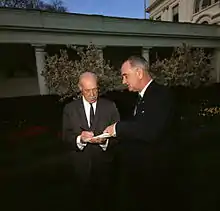Les Whitten
Les Whitten (February 21, 1928 – December 2, 2017) was an American investigative reporter at the Washington Merry-Go-Round under Jack Anderson, as well as translator of French poetry by Baudelaire and influential novelist of horror and science fiction books.[1][2][3][4][5]
Les Whitten | |
|---|---|
| Born | Leslie Hunter Whitten Jr. February 21, 1928 |
| Died | December 2, 2017 (aged 89) |
| Alma mater | Lehigh University |
| Occupations |
|
| Employer | "Washington Merry-Go-Round" |
| Spouse | Phyllis Webber |

Background
Leslie Hunter Whitten, Jr., was born on February 21, 1928, in Jacksonville, Florida. His father was an electrical engineer and executive with the manufacturer Graybar. His mother was a Latin teacher. He grew up in Washington, DC, and attended the Woodrow Wilson High School. "From the time I was 18, I wanted to be a poet," Whitten said later in life. Whitten started at Lehigh University by majoring in civil engineering. After three semesters he left school, served two years in the U.S. Army, and moved to Paris to become a poet. Returning to Lehigh, he changed his major to English and Journalism, became the editor-in-chief of the student newspaper, and graduated magna cum laude in 1950.[3][4][6][7][8]
Career
Journalism

Whitten then moved to Mexico and again to Paris, continuing to try to be a writer, before shifting back to journalism in order to support his new family. He then joined the Munich office of Radio Free Europe in 1951 (or 1952), where he worked until 1957. Between 1957 and 1969, he worked for International News Service and United Press International and covered wars in the Dominican Republic and Vietnam.[3][4][6]
Washington Merry-Go-Round

By 1969, Whitten, now an investigative reporter, had worked for Washington Post and Hearst newspapers and joined the Washington Merry-Go-Round under Jack Anderson, following the death of Anderson's business partner and the column's founder, Drew Pearson. Staff included Brit Hume (later a Fox News anchor) and Jon Lee Anderson (later staff writer for The New Yorker). Coverage by the Washington Merry-Go-Round included a CIA plot to assassinate Fidel Castro and Nixon's secret foreign policy shift to Pakistan from India. Whitten's specific assignments included investigating the private lives of FBI Director J. Edgar Hoover and top aide Clyde Tolson.[3][4]
Watergate
During Watergate, Mark Feldstein—author of "Poisoning the Press: Richard Nixon, Jack Anderson and the Rise of Washington's Scandal Culture."—claimed that Whitten was known to have threatened at least one of his sources by saying "If you don't give this to me, I'll say it came from you, but, if you give it to me, we'll have lunch and I'll say it came from 'a source near the White House'."[3]
"Aspirin Roulette"
The Nixon administration had the CIA trail Whitten and Anderson. G. Gordon Liddy and E. Howard Hunt even plotted to assassinate Anderson by using LSD (described by Liddy as "Aspirin Roulette"). Later, Liddy recalled in memoirs, they rejected the placing of poisoned aspirin in Anderson's medicine cabinet for two reasons: it might endanger family members – and might take months to work.[3]
"Free Les Whitten"
In 1973, FBI agents arrested Whitten and Hank Adams as they helped load stolen government documents into his car, earlier taken from the Bureau of Indian Affairs by Native American activists after the Trail of Broken Treaties protest and occupation of the BIA offices. Whitten faced indictment in a First Amendment and ten years in jail. Reporter in Washington wore "Free Les Whitten" buttons; Herblock drew a political cartoon about him. To secure a government witness for Whitten, Jack Anderson asked Interior Secretary Rogers Morton to "slip me some confidential memos on what you've done" against Native Americans. Secretary Morton complied: Anderson told Whitten, "If this ever comes to trial we're going to have a heck of a witness for your defense."[3][4][9]
The National Suggestion Box
In 1975, Whitten and Anderson started another project, called "The National Suggestion Box", headed by Marty Devolites. From offices in Washington, DC, it conducted on the ground research on topics suggested by the general public then investigated by researchers on staff including Joanne Patti Munisteri. Reports were culled from its research for short spots on the Good Morning America TV show and other media Anderson was responsible for in print, radio and TV.[3]
Writing

Whitten wrote nearly a dozen novels–political thrillers, horror, and science fiction – and translated poetry by Baudelaire from French into English.[4]
In 1976, his book Conflict of Interest met with such success that by 1978 he had stepped away from journalism to concentrate on his own writing.[4][1][6][10][11] He wrote multiple novels, as well as other books including a children's book, a biography of lawyer F. Lee Bailey, and a translation of French poet Charles Baudelaire, in his spare time while working as a journalist and then full-time later.[1][6][10] His 1967 Gothic horror novel Moon of the Wolf became a made-for-television film, also called Moon of the Wolf, broadcast in 1972.[12]
Personal and death
On November 11, 1951, Whitten married Phyllis Webber (born August 6, 1928) in Paris. The couple had three sons. The Whittens were active in the Episcopal Diocese of Washington, DC. They also supported the arts, including ballet and opera.[4][13]
Whitten died age 89 on December 1, 2017, of sepsis in a hospital in Adelphi, Maryland.[3][4][14]
Phyllis Webber
Phyllis Webber, who hailed from Schaefferstown, Pennsylvania, earned a degree in education from Cedar Crest College in Allentown, Pennsylvania, and worked with preschool children at the Henry Street Settlement in New York City. When the couple moved to Washington, D.C., in 1959, she continued to work in education. In 1973, she became director of the Suburban Nursery School of Bethesda, Maryland, until her retirement in 1993. In 1996, she received a lifetime achievement award from the Maryland Council of Parent Participant Nursery Schools. She died on January 11, 2017.[13][4]
Legacy
In 1978, Jack Anderson called Whitten "the best reporter in the country" and said that Whitten had worked on nearly all stories for a decade at the Washington Merry-Go-Round. New York Times journalist Tom Buckley[15] once called him Jack Anderson's "senior ferret".[3]
The Weekly Standard credits Whitten for having "reinvented Horror and Science Fiction" book genres. The newspaper relates that the vampire horror story The Progeny of the Adder (1965) influenced the 1970s television series Kolchak: The Night Stalker, which in turn influenced the 1990s television series The X-Files. Stephen King listed it among essential horror novels in his non-fiction book Danse Macabre.[5]
Works
Fiction:
- Progeny of the Adder (Crime Club by Doubleday, 1965). Set in Washington, D.C. in the mid-1960s. Our hero is a DC cop who gradually learns that he is up against something unusual.
- Moon of the Wolf (Crime Club by Doubleday, 1967). Also known as Death of the Nurse, the book, set in the Mississippi delta in 1938, concerns a series of grisly murders.
- Pinion, the Golden Eagle. (Van Nostrand, 1968) Alternates between the story of a golden eagle's attempts to evade hunters, and the progress of legislation in Washington outlawing eagle hunting.[16]
- The Alchemist (Charterhouse, 1973). Two people caught up in the world of Washington politics find themselves drawn together by their interest in the occult. Translated into Spanish in 1980.
- Conflict of Interest (Bantam Books, 1976). A veteran newspaper reporter exposes scandal at the highest levels of the U.S. Senate.
- Sometimes a Hero (Doubleday, 1979). A crack Washington, D.C. lawyer takes on Big Oil.[1][10]
- A Killing Pace (Atheneum, 1983). A thriller about a private detective who helps his lawyer friend escape the clutches of the mafia and the Red Brigades.[17]
- A Day Without Sunshine (Atheneum, 1985). This book centers around an English crime kingpin who attempts to monopolize the wine industry.[18]
- The Lost Disciple: the book of Demas (Atheneum, 1989). The life of Jesus as seen by a minor biblical character Demas.[1][10] Translated into Spanish in 1993.
- The Fangs of Morning (Leisure Books, 1994).[1]
- Moses, The Lost Book of the Bible (New Millennium Press, 1999). A fictionalization of the life of the prophet Moses, narrated by a Greek arms trader.[1][19]
Biography:
- F. Lee Bailey (Avon, 1971). A biography of lawyer F. Lee Bailey.[20]
Poetry:
- Washington Cycle (The Smith, 1979). A collection of some of Whitten's poems.[21]
Translations:
- Sad Madrigals (Preternatural Press, 1997). Poems by Baudelaire, translated by Whitten.[1]
- The Rebel (Presa S Press, 2005). Poems by Baudelaire, translated by Whitten.
References
- The Gale Group (2005), "Whitten, Leslie Hunter, Jr.", Writers Directory 2005, archived from the original on March 28, 2015.
- "Matches for Leslie Hunter "Les" Whitten, Jr". MyHeritage.
- Smith, Harrison (December 2, 2017). "Les Whitten, investigative reporter arrested by FBI and spied on by CIA, dies at 89". The Washington Post. Retrieved December 7, 2017.
- Smith, Harrison (December 7, 2017). "Les Whitten, investigative reporter arrested by FBI and spied on by CIA, dies at 89". The New York Times. Retrieved December 7, 2017.
- Hemingway, Mark (December 6, 2017). "The Washington Reporter Who Reinvented Horror and Science-Fiction". Weekly Standard. Retrieved December 7, 2017.
- Henscom, Leslie (June 19, 1983), "Ex-hotshot reporter likes writer's life", The Bulletin.
- Shimer, Elizabeth (Winter 2005), "Les Whitten '50: A novel approach to life", Lehigh Alumni Bulletin
- "Author Les Whitten To Show Work At Lehigh Fyi", Lehigh Valley Morning Call, April 20, 1988
- Adams, Jim (January 11, 2006), "Hank Adams: American Indian Visionary 2006", Indian Country Today, archived from the original on March 29, 2015
- Streitfeld, David (December 24, 1989), "Lost, But Now Found", The Washington Post, archived from the original on March 28, 2015. A review of Whitten's book The Lost Disciple, this article also includes some biographical detail about Whitten.
- Whitten, Les (December 27, 2005), "Eulogy for a Muckraker", HuffPost
- Golden, Christopher; Bissette, Stephen R.; Sniegoski, Thomas E. (2000), The Monster Book, Simon and Schuster, p. 262, ISBN 978-0-671-04259-2.
- "Phyllis Webber Whitten". The Washington Post. February 5, 2017. Retrieved February 23, 2017.
- "Remembering Les Whitten". Politico. December 3, 2017. Retrieved December 16, 2017.
- Weber, Bruce (November 20, 2015). "Tom Buckley, Versatile and Colorful Times Reporter, Dies at 87" – via NYTimes.com.
- "Pinion, the Golden Eagle", Kirkus Reviews, retrieved April 14, 2012.
- Burton, Philip Ward (July 30, 1983), "Burton on Books: A Killing Pace", Madison Courier.
- Burton, Philip Ward (November 27, 1985), "Burton on Books: A Day Without Sunshine", Madison Courier.
- "In Brief: Moses: The Last Book of the Bible", The Washington Post, July 9, 2000, archived from the original on March 29, 2015.
- Dygert, James H. (1976), The investigative journalist: folk heroes of a new era, Prentice-Hall, p. 105, ISBN 978-0-13-502310-5.
- Kessler, Jascha (July 22, 1979), "Whitten poetizing on the Potomac", Los Angeles Times.
External links
- Finding Aid to the Leslie Hunter Whitten, Jr. Papers, Special Collections, Linderman Library, Lehigh University